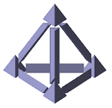
 |
An ontology is an explicit specification of a conceptualization (an abstract, simplified view of the world). An ontology can also be thought of as as set of concept definitions, categorizing things that exist or may exist in some domain. The term ontology is borrowed from philosophy, where it refers to a systematic account of what can exist or 'be' in the world. In the fields of Artificial Intelligence and Knowledge Representation the term refers to the construction of knowledge models which specify a set of concepts, their attributes, and the relationships between them.
The key ingredients that make up an ontology are a vocabulary of basic terms and a precise specification of what those terms mean. An ontology provides a set of well-founded constructs that can be leveraged to build meaningful higher level knowledge. An informal ontology may be specified by a catalog of types that are either undefined or defined only by statements in a natural language. A formal ontology is specified by a collection of names for concept and relation types organized in a partial ordering by the type-subtype relation. When the knowledge of a domain is represented formally, the set of objects that can be represented is called the universe of discourse.
For Geodise we will see ontologies being created that capture the concepts and vocabularies of the design process, in other words, the common language used by design engineers to describe what they do. This will be a major advantage for low experience users of the portal who will then be able to share in the wider knowledge of the community.
School of Engineering Sciences, University of Southampton, Highfield, Southampton SO17 1BJ
Tel: +44 (0)2380 593116, Fax: +44 (0)2380 597082 Email: projectoffice@geodise.org
© The Geodise Project 2001-2004
